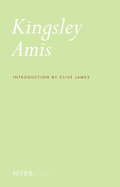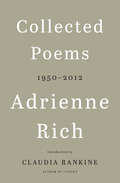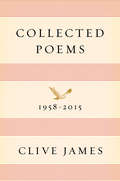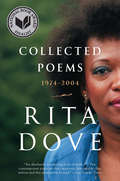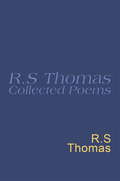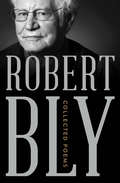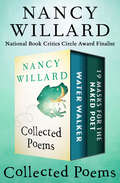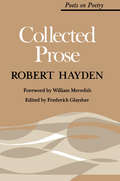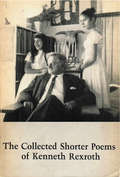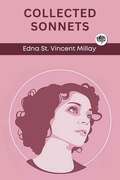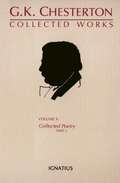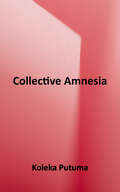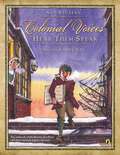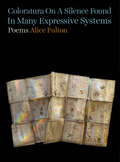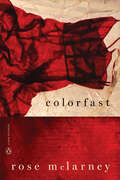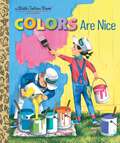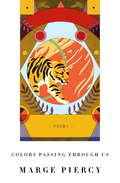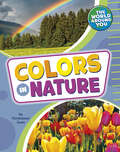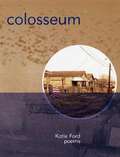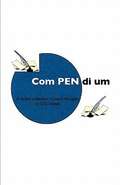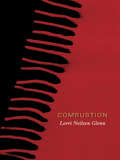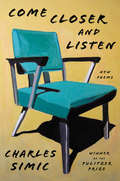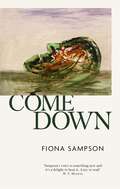- Table View
- List View
Collected Poems: 1944-1979
by Kingsley Amis Clive JamesKingsley Amis's poetry tackles all the grimly humorous subjects he tackled in his novels--lust, lost love, booze, money and the lack of it, old age, death--and does so with immense formal poise. A master of both traditional and unconventional meters with a perfect ear for parody, Amis wrote satires, epigrams, and rueful and scornful songs that are remarkable not only for their virtuosity and humor but for their scabrous realism. It all adds up to a small, entirely individual, and memorably bracing body of work. As Amis writes: "Beauty, they tell me, is a dangerous thing, / Whose touch will burn, but I'm asbestos, see?"
Collected Poems: 1950-2012
by Adrienne Rich Claudia RankineThe collected works of Adrienne Rich, whose poetry is "distinguished by an unswerving progressive vision and a dazzling, empathic ferocity" (New York Times). Adrienne Rich was the singular voice of her generation and one of our most important American poets. She brought discussions of gender, race, and class to the forefront of poetical discourse, pushing formal boundaries and consistently examining both self and society. This collected volume traces the evolution of her poetry, from her earliest work, which was formally exact and decorous, to her later work, which became increasingly radical in both its free-verse form and feminist and political content. The entire body of her poetry is on display in this vast volume, including the National Book Award-winning Diving Into the Wreck and her prize-winning Atlas of the Difficult World. The Collected Poems of Adrienne Rich gathers and memorializes all of her boldly political, formally ambitious, thoughtful, and lucid work, the whole of which makes her one of the most prolific and influential poets of our time.
Collected Poems: 1958-2015
by Clive JamesThe "technically and emotionally heart-stopping poems" (Spectator) of Clive James are collected in this decades-spanning volume. The poetry of Clive James has been delighting readers and winning awards for decades. His recent poems looking back over his extraordinarily rich life have brought him an even wider readership; some, such as "Japanese Maple" (first published in The New Yorker), became global news events upon their publication. In this first collected volume of poetry, James makes his own selection from over fifty years' work in verse: from his early satires to his late poems of valediction, he proves himself to be as well-suited to the intense demands of the short lyric as to those of the comic excursion. Collected Poems places James's effortless fluency, his breath-taking thematic range, and his emotional power on full display--and will burnish his reputation as one of the most accomplished of our contemporary poets.
Collected Poems: 1974-2004
by Rita DoveThree decades of powerful lyric poetry from a virtuoso of the English language in one unabridged volume. Rita Dove's Collected Poems 1974-2004 showcases the wide-ranging diversity that earned her a Pulitzer Prize, the position of U.S. poet laureate, a National Humanities Medal, and a National Medal of Art. Gathering thirty years and seven books, this volume compiles Dove's fresh reflections on adolescence in The Yellow House on the Corner and her irreverent musings in Museum. She sets the moving love story of Thomas and Beulah against the backdrop of war, industrialization, and the civil right struggles. The multifaceted gems of Grace Notes, the exquisite reinvention of Greek myth in the sonnets of Mother Love, the troubling rapids of recent history in On the Bus with Rosa Parks, and the homage to America's kaleidoscopic cultural heritage in American Smooth all celebrate Dove's mastery of narrative context with lyrical finesse. With the "precise, singing lines" for which the Washington Post praised her, Dove "has created fresh configurations of the traditional and the experimental" (Poetry magazine).
Collected Poems: Collected Poems : R S Thomas
by R.S. ThomasPublished to mark the poet's 80th birthday, this collection confirms R. S. Thomas as our pre-eminent poet.'This is the book I've been waiting for' Ted Hughes
Collected Poems: Collected Poems : R S Thomas
by rev R.S. ThomasPublished to mark the poet's 80th birthday, this collection confirms R. S. Thomas as our pre-eminent poet.'This is the book I've been waiting for' Ted Hughes
Collected Poems: Collected Prose Poems (Wesleyan Poetry Ser.)
by Robert BlyGathering more than sixty years of poetry, Collected Poems showcases the brilliant career of a "great American transcendentalist" (New York Times). An extraordinary culmination for Robert Bly’s lifelong intellectual adventure, Collected Poems presents the full magnitude of his body of work for the first time. Bly has long been the voice of transcendentalism and meditative mysticism for his generation; every stage of his work is warmed by his devotion to the art of poetry and his affection for the varied worlds that inspire him. Influenced by Emerson and Thoreau alongside spiritual traditions from Sufism to Gnosticism, he is a poet moved by mysteries, speaking the language of images. Collected Poems gathers the fourteen volumes of his impressive oeuvre into one place, including his imagistic debut, Silence in the Snowy Fields (1962); the clear-eyed truth-telling of his National Book Award–winning collection, The Light Around the Body (1967); the masterful prose poems of The Morning Glory (1975); and the fiercely introspective, uniquely American ghazals of his latest collection, Talking into the Ear of a Donkey (2011). A monumental poetic achievement, Collected Poems makes clear why poets and lovers of poetry have long looked to Robert Bly for emotional authenticity, moral authority, and artistic inspiration.
Collected Poems: Water Walker and 19 Masks for the Naked Poet
by Nancy WillardThe lyrical poems of award-winning author Nancy Willard celebrate the magic of life Nancy Willard, who was the first recipient of a Newbery Medal for a volume of poetry, displays her versatility in these companion collections.Divided into five sections, Water Walker blends the mundane with the mystical. From sleeping fish to Marco Polo to a tortoise who dispenses unique advice to a bride on her wedding day, these poems integrate fables, nursery rhymes, hymns, and songs.In 19 Masks for the Naked Poet, the human soul reveals itself, as we remove the disguises that bind (and blind) us to everyday life. Fanciful images of nature—dozing bees, green lions—infuse this collection. Doors become mirrors and husbands float above their marital beds as Willard explores themes of family, love, spirituality, politics, and immortality. Her &“poet&” experiences everything from the sacred to the profane, from photographing his heart to meeting God in creations that are enchanting and surreal. This ebook includes illustrations by Regina Shekerjian.
Collected Prose (Poets On Poetry)
by Robert Hayden"A collection of essays on poetry and the experiences that influenced poet Robert Hayden. Contents include "The History of Punchinello: A Baroque Play in One Act," Hayden's introductory remarks to volumes like Kaleidoscope: Poems by American Negro Poet and The New Negro, and interviews with Hayden."
Collected Shorter Poems
by Kenneth RexrothThis volume brings together all of Kenneth Rexroth's shorter poems from 1920 to the present, including a group of new poems written since the publication of Natural Numbers, drawn from seven earlier books. This volume brings together all of Kenneth Rexroth's shorter poems from 1920 to the present, including a group of new poems written since the publication of Natural Numbers, drawn from seven earlier books. Among the American poets of the generation that came to prominence in the Forties, Kenneth Rexroth has been notable both for the independence of his personal voice and for his accessibility to the tradition of international avant-garde literature. He began writing and publishing in magazines at fifteen. His earliest work was personal and concrete, much like that of the Imagists. In his twenties he wrote in the disassociative style--sometimes called "literary cubism "--developed by Mallarmé, Apollinaire, and Reverdy. This was not free association, but the conscious disassociation and recombination of the elements of the poem to achieve the highest possible level of significance. With his later books Rexroth moved back to a direct and classically simple form of personal statement. In this period he wrote the great nature poems, the love poems, and the contemplative lyrics that have established his reputation as one of the most important American poets.
Collected Sonnets
by Edna St. Vincent Millay"Edna St. Vincent Millay's 'Collected Sonnets' captures the essence of her poetic soul. With an unwavering focus on love, nature, and the human experience, Millay's sonnets unfold like delicate petals of a blossoming flower. Through her evocative verses, she immerses readers in a world of beauty and emotion, leaving a lasting impression on the heart and mind. This anthology is a literary gem, revealing the enduring impact of one of America's most gifted poets."
Collected Works
by Nikesh MuraliA collection of some witty and some mundane love poems from Pushcart Award winning author Nikesh Murali.
Collected Works of G. K. Chesterton: Collected Poetry
by Aidan MackeyThe Collected Works of G.K. Chesterton: Collected Poetry Part 1
Collective Amnesia
by Koleka PutumaThis highly-anticipated debut collection from one of the country’s most acclaimed young voices marks a massive shift in South African poetry. Koleka Putuma’s exploration of blackness, womxnhood and history in Collective Amnesia is fearless and unwavering. Her incendiary poems demand justice, insist on visibility and offer healing. In them, Putuma explodes the idea of authority in various spaces – academia, religion, politics, relationships – to ask what has been learnt and what must be unlearnt. Through grief and memory, pain and joy, sex and self-care, Collective Amnesia is a powerful appraisal, reminder and revelation of all that has been forgotten and ignored, both in South African society, and within ourselves.Koleka Putuma was born in Port Elizabeth in 1993. An award-winning performance poet, facilitator and theatre-maker, her plays include UHM and Mbuzeni, as well as two two plays for children, Ekhaya and Scoop. Her work has travelled around the world, with her poetry garnering her national prizes, such as the 2014 National Poetry Slam Championship and the 2016 PEN South Africa Student Writing Prize.
Colonial Voices: The Outbreak of the Boston Tea Party Told from Multiple Points-of-View!
by Kay WintersFollow an errand boy through colonial Boston as he spreads word of rebellion.It?s December 16, 1773, and Boston is about to explode! King George has decided to tax the colonists' tea. The Patriots have had enough. Ethan, the printer's errand boy, is running through town to deliver a message about an important meeting. As he stops along his route - at the bakery, the schoolhouse, the tavern, and more readers learn about the occupations of colonial workers and their differing opinions about living under Britain's rule. This fascinating book is like a field trip to a living history village.
Coloratura On A Silence Found In Many Expressive Systems: Poems
by Alice FultonA celebrated poet returns with a vibrant and kaleidoscopic improvisation on the broken body and questing spirit. “I was living in a high-maintenance loneliness,” Alice Fulton writes of a devastating accident, and her poems express both reverence and impatience as they search for a brightness palpable as the dark. The result is a brilliant coloratura on the senses. Fulton evokes phantom aromas of vanished perfumes, flowers fragrant only at night, and the ozone scent of snow; marvels at velvet paintings and chimerical colors outside the spectrum; and riffs on a mixtape of ambient sounds: applause, clinking glasses, spectral voices on the radio, and the whispers of a mother to her children. Coloratura On A Silence Found In Many Expressive Systems extends these tactile mysteries to existential questions of invisible miracles, connection, and faith in the face of silence: “By praying you, I create you,” the poet informs an elusive God. Reveling in the stunning possibilities of language, Fulton seeks joy to counteract trauma and grief, empathizes with the silent pathos of animals, and finds solace in art, friendship, and the mysterious power of gifts. Without denying suffering, this enthralling volume extends a fervent prayer for gratitude and healing.
Colorfast (Penguin Poets)
by Rose McLarneyA haunting, intimate, and beautifully-crafted collection of poems rooted in southern Appalachia that reflects on loss and remembrance—and reaches beyond the constraints of time and placeRose McLarney&’s fourth collection of poems, Colorfast, reckons with fading and bleeding away, the gray of aging and the gray areas to which truths are relegated. McLarney reconsiders girlhood stories, acknowledges omissions from Southern history, and studies the silences of women&’s and other voices left out of accounts of the past. Yet she does not write of only what has been lost, defying elegy with tributes to her mother while she is alive to read them, and finding vibrancy that remains in sources such as weeds, gravel, insect shells, and the flawed human body. Colorfast weaves its threads into poems that, like the women who dwell in them, are subtly strong enough to stand alone, while they also connect into a provocative conversation about heritage and the holds we can keep.
Colors Are Nice (Little Golden Book)
by Adelaide HollA beloved 1962 Little Golden Book about colors (and not just primary ones) is back in print!"I like the way the sky is blue,And I like orange oranges, too.But I LOVE mixed-up colors best—A baby robin's speckled breast,Blackish dots on greenish frogs,Rainbow beetles under logs."This poetic look at colors, told in simple rhyme, celebrates not only primary colors, but "colors all mixed up!" Cheerful, elegant rhyme teaches about stripes, sparkles, and spots on adorable animals and in beautiful landscapes. Noted illustrator Leonard Shortall's lush illustrations of adorable animals and children will once again captivate little ones.
Colors Passing Through Us
by Marge PiercyIn Colors Passing Through Us, Marge Piercy is at the height of her powers, writing about what matters to her most: the lives of women, nature, Jewish ritual, love between men and women, and politics, sexual and otherwise.Feisty and funny as always, she turns a sharp eye on the world around her, bidding an exhausted farewell to the twentieth century and singing an "electronic breakdown blues" for the twenty-first. She memorializes movingly those who, like los desaparecidos and the victims of 9/11, disappear suddenly and without a trace.She writes an elegy for her mother, a woman who struggled with a deadening round o fhousework, washin gon Monday, ironing on Tuesday, and so on, "until stroke broke/her open." She remembers the scraps of lace, the touch of velvet, that were part of her maternal inheritance and fist aroused her sensual curiosity.Here are paeans to the pleasures of the natural world (rosy ripe tomatoes, a mating dance of hawks) as the poet confronts her own mortality in the cycle of seasons and the eternity of the cosmos: "iam hurrying, I am running hard / toward I don't know what, / but I mean to arrive before dark." Other poems--about her grandmother's passage from Russia to the New World, or the interrupting of a Passover seder to watch a comet pass--expand on Piercy's appreciation of Jewish life that won her so much acclaim in The Art of Blessing the Day. Colors Passing Through Us is a moving celebration of the endurance of love an dof the phenomenon of life itself--a book to treasure.From the Hardcover edition.
Colors in Nature (The World Around You)
by Christianne JonesFrom vibrant red flowers and clear blue skies to big brown trees and buzzing yellow bees, color is everywhere in nature. Interactive, rhyming text and bright photographs bring the bold colors of nature to young readers in this picture book.
Colosseum: Poems
by Katie FordColosseum confronts ruin in the ancient world and in the living moment, from historical accounts and from firsthand experience. Displaced from New Orleans after Hurricane Katrina, Katie Ford returns these powerful poems attesting to the storm's ferocity and its aftershock. Ford examines other catastrophes--those biblical, obscured by time, and those that play out daily, irrefutably, in the media, all through poetry. Colosseum is an essential, moving book in its insistence that our fates are intertwined and that devastation does not discriminate.
Com Pen Di Um: A Simple Collection of Many Thoughts
by D. G. SmeallWithin the covers of this small volume is a small collection of many thoughts about life. Throughout a life are present many stages, cycles, fears, joys and roles one takes upon one's self. For D. G. Smeall, this poetry collection highlights key moments in her life. D. G. explores life through a different window and lives with disability, determined to achieve and grow up normal.
Combustion
by Lorri Neilsen GlennLorri Neilsen Glenn’s poems welcome the reader into a place where the strange is made familiar and the familiar reveals its own magic. Here the combustible materials of childhood and old age are always potentially present, and the attention paid them multi-dimensional. Her poems engage their subjects with wits and senses on full alert, whether the occasion is an encounter with the full moon during a lonely drive across the prairies, a raucous community dance at the oldest dance hall in the Maritimes, or the opening of the door into “the small town inside”. Reaching from nature to human nature, often drawn by the long line and the hum of loss, Neilsen Glenn explores a full range of poetic possibilities.
Come Closer and Listen: New Poems
by Charles SimicAn insightful and haunting new collection from Pulitzer Prize-winning poet Charles Simic Irreverent and sly, observant and keenly imagined, Come Closer and Listen is the latest work from one of our most beloved poets. With his trademark sense of humor, open-hearted empathy, and perceptive vision, Charles Simic roots his poetry in the ordinary world while still taking in the wide sweep of the human experience. From poems pithy, wry, and cutting—“Time—that murderer/that no has caught yet”—to his layered reflections on everything from love to grief to the wonders of nature, from the story of St. Sebastian to that of a couple weeding side by side, Simic’s work continues to reveal to us an unmistakable voice in modern poetry. An innovator in form and a chronicler of both our interior lives and the people we are in the world, Simic remains one of our most important and lasting voices on the page.
Come Down
by Fiona SampsonWinner of the Naim Frashëri Laureateship of Albania and Macedonia Winner of the European Lyric Atlas Prize 'Fiona Sampson's voice is something new and it's a delight to hear it . . . A joy to read' W. S. MerwinQuestions of humanity, of point of view, are at the heart of Fiona Sampson's new collection, Come Down.Throughout, Sampson's poems shimmer between the human perspective and what is beyond - some larger, longer-term consciousness. Language runs and dances over the stuff of the human body and the material of the landscape. And yet, despite these radical perspective shifts, the collection keeps in sight, always, the human experience: the act of creation; the way in which childhood memory and family lore impinge on the present. Come Down ends with a long, eponymous poem, which moves fluidly and brilliantly through different forms of memory.
